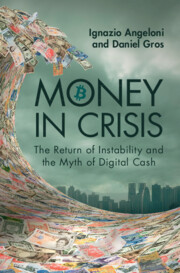Refine search
Actions for selected content:
310 results
8 - Holding against the Storming
-
- Book:
- Ability and Difference in Early Modern China
- Published online:
- 10 September 2025
- Print publication:
- 11 September 2025, pp 186-211
-
- Chapter
- Export citation
7 - Commerzbank
-
- Book:
- Extroverted Financialisation
- Published online:
- 07 August 2025
- Print publication:
- 21 August 2025, pp 127-142
-
- Chapter
- Export citation
Specialist mental health crisis centres in England: a step forward or a stumble in the dark?
-
- Journal:
- BJPsych Open / Volume 11 / Issue 5 / September 2025
- Published online by Cambridge University Press:
- 19 August 2025, e187
-
- Article
-
- You have access
- Open access
- HTML
- Export citation
Macroeconomic populism in Chile: Allende and the recession of 1973
-
- Journal:
- Revista de Historia Economica - Journal of Iberian and Latin American Economic History , First View
- Published online by Cambridge University Press:
- 06 August 2025, pp. 1-28
-
- Article
- Export citation
2 - Orders in Transition and Implications for Political Legitimacy
- from Part I - Setting the Stage
-
- Book:
- The Law and Politics of International Legitimacy
- Published online:
- 14 July 2025
- Print publication:
- 24 July 2025, pp 24-38
-
- Chapter
- Export citation
17 - Change of International Order and Legitimacy
- from Part V - International Legitimacy and Change
-
- Book:
- The Law and Politics of International Legitimacy
- Published online:
- 14 July 2025
- Print publication:
- 24 July 2025, pp 318-349
-
- Chapter
- Export citation

Money In Crisis
- The Return of Instability and the Myth of Digital Cash
-
- Published online:
- 15 July 2025
- Print publication:
- 12 June 2025
Pandemics meet democracy: the footprint of COVID-19 on democratic attitudes
-
- Journal:
- Political Science Research and Methods , First View
- Published online by Cambridge University Press:
- 15 July 2025, pp. 1-10
-
- Article
-
- You have access
- Open access
- HTML
- Export citation
11 - What Is the Societal Impact of Innovation?
-
- Book:
- Innovation Management
- Published online:
- 06 June 2025
- Print publication:
- 10 July 2025, pp 160-177
-
- Chapter
- Export citation
Rapid Communication: The Fate of Global Humanitarian Assistance Amidst Growing Health Challenges
-
- Journal:
- Disaster Medicine and Public Health Preparedness / Volume 19 / 2025
- Published online by Cambridge University Press:
- 27 June 2025, e167
-
- Article
-
- You have access
- Open access
- HTML
- Export citation
6 - Dehumanising Refugees
- from Part II - Confronting Global Contradictions
-
- Book:
- Global Crisis and Insecurity
- Published online:
- 01 June 2025
- Print publication:
- 12 June 2025, pp 132-153
-
- Chapter
- Export citation
3 - The Existential Unsettling of Security
- from Part II - Confronting Global Contradictions
-
- Book:
- Global Crisis and Insecurity
- Published online:
- 01 June 2025
- Print publication:
- 12 June 2025, pp 61-85
-
- Chapter
- Export citation
1 - The Future of Humanity Does Not Look Good
- from Part I - The Dark Energy of Our Time
-
- Book:
- Global Crisis and Insecurity
- Published online:
- 01 June 2025
- Print publication:
- 12 June 2025, pp 3-32
-
- Chapter
- Export citation
12 - Moving towards a Manifesto
- from Part III - Struggling for Positive Human Development
-
- Book:
- Global Crisis and Insecurity
- Published online:
- 01 June 2025
- Print publication:
- 12 June 2025, pp 279-308
-
- Chapter
- Export citation
Preface
-
- Book:
- Money In Crisis
- Published online:
- 15 July 2025
- Print publication:
- 12 June 2025, pp ix-xii
-
- Chapter
- Export citation
Democracy through crises: state, regions and the influence of technocracy and expertise in Italy (2008–2020)
-
- Journal:
- Italian Political Science Review / Rivista Italiana di Scienza Politica , First View
- Published online by Cambridge University Press:
- 22 May 2025, pp. 1-15
-
- Article
-
- You have access
- Open access
- HTML
- Export citation
‘I would have killed myself had it not been for this service’: qualitative experiences of NHS and third sector crisis care in the UK
-
- Journal:
- BJPsych Open / Volume 11 / Issue 3 / May 2025
- Published online by Cambridge University Press:
- 14 May 2025, e107
-
- Article
-
- You have access
- Open access
- HTML
- Export citation
Myanmar Earthquake Aftermath – Critical Update and Expanded Analysis
- Part of
-
- Journal:
- Disaster Medicine and Public Health Preparedness / Volume 19 / 2025
- Published online by Cambridge University Press:
- 06 May 2025, e125
-
- Article
-
- You have access
- Open access
- HTML
- Export citation
Global social policy ideas in the COVID-19 crisis: Ideational change and continuity in the ILO, the OECD, the WHO, and the World Bank
-
- Journal:
- Journal of International and Comparative Social Policy / Volume 41 / Issue 1 / March 2025
- Published online by Cambridge University Press:
- 22 April 2025, pp. 1-15
-
- Article
-
- You have access
- Open access
- HTML
- Export citation
2 - The Great Conflagration (1914–1918)
-
- Book:
- The European Art Market and the First World War
- Published online:
- 10 April 2025
- Print publication:
- 17 April 2025, pp 66-104
-
- Chapter
- Export citation
